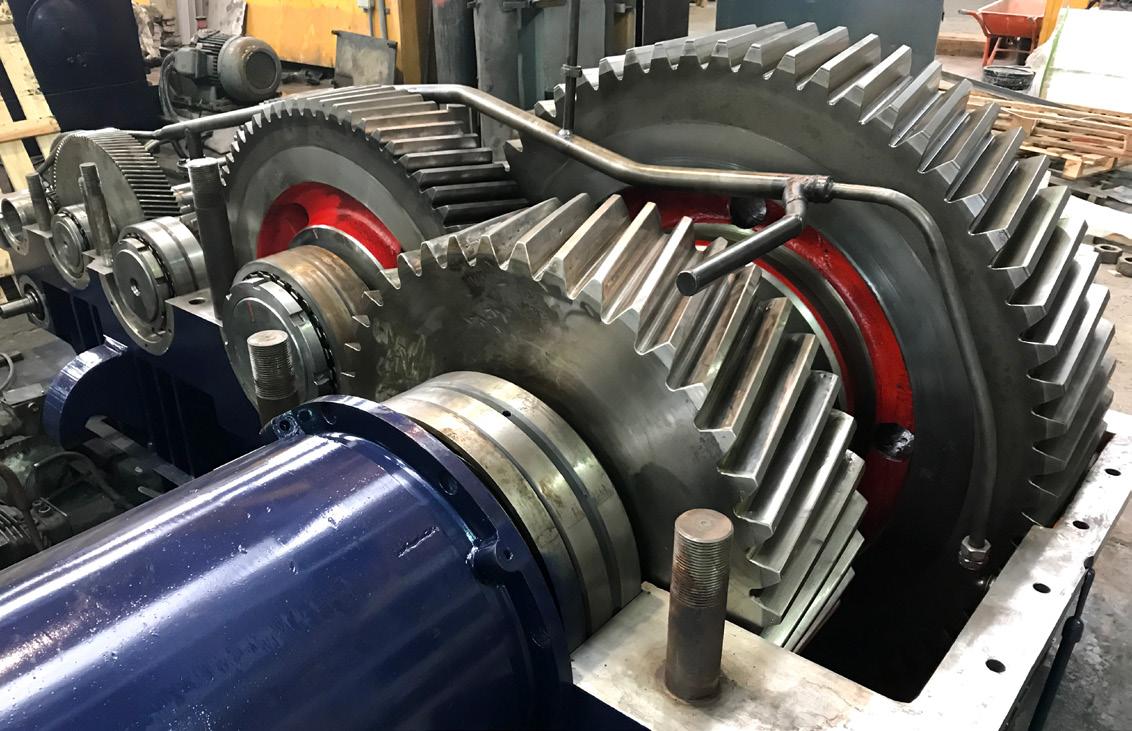
2 minute read
Understanding seals: Pushing the boundaries of gearbox performance
Healthy seals are critical for effective industrial gearbox function. Afton is leading the quest for a deeper understanding of the mechanisms behind seal failure modes, to enhance gearbox and lubricant performance and durability.
Afton is exploring elastomer degradation pathways that lead to NBR seal failure in the SEW dynamic seals test to identify formulations that can counter undesirable seal interactions and still meet all other OEM requirements –including friction capabilities for the Ortlinghaus clutch test.
Using bespoke testing to design universal gear lubricants, with seal longevity as a prime objective, directly contributes to greater productivity and lower costs.
Importance of industrial gears
Only a gearbox can deliver the range of input speeds, torques and directions of movement that different machines need for optimum efficiency and productivity. To transmit power from an energy source to machinery, gearboxes need four elements: gears, input/output shaft, roller bearings and seals. Applications vary from incinerators, crane hoists and crushers to steel forming equipment, conveyors and machine tools, not forgetting wind turbines and ship propellers.
Significance of seals
Keeping metal gears, shafts and bearings cool and protecting them from wear, heavy loads and corrosion requires a suitable lubricant. This lubricant also has an important role to play in looking after the seals, which are vital for keeping the lubricant inside the gearbox and preventing contaminants from getting in.
Compatibility with elastomer materials of shaft seals must therefore be a primary consideration when formulating lubricants. Poor chemical compatibility or leaching –whether caused by the base oil or additives – can result in swelling, shrinkage, hardening or other physical changes to the elastomer that will affect seal integrity and performance.
Seal elastomers compared
Most seals are made from nitrile butadiene rubber (NBR) or fluoroelastomer (FKM). Material choice depends on cost, gearbox operating temperatures, shaft speeds and direction of rotation, levels of external contamination and compatibility with any liquids or gases the seal may come into contact with.
Nbr
A more economical material, NBR is used widely for the good balance it offers between wear resistance and natural chemical resistance to a range of petroleum oils, fuels and greases. These seals work well in operating temperatures from around -35oC to 110oC and are used often for larger industrial applications. Wetting the area between seal and shaft with lubricant is achieved relatively easily, helping protect the shaft from wear.
Fkm
Priced at a premium to NBR, FKM seals offer exceptional resistance to most chemicals – although can struggle with fluids containing certain chemistries. Performing well at higher temperatures of up to 200oC, they can be used down to around -20oC, below which they start to harden and lose their flexibility. Popular for applications involving greater movement, high heat and/or chemical processing, FKM seals are less easily wetted so can result in greater shaft wear if not adequately protected by the lubricant.
© 2023. Afton Chemical Corporation is a wholly owned subsidiary of NewMarket Corporation (NYSE:NEU). 01/23. The information in this bulletin is, to our best knowledge, sure and accurate, but all recommendations or suggestions are made without guarantee since the conditions of use are beyond our control. Afton Chemical Corporation and its affiliates disclaim any liability incurred in connection with the use of these data or suggestions. Furthermore, nothing contained herein shall be construed as a recommendation to use any product in conflict with existing patents covering any material or its use.




